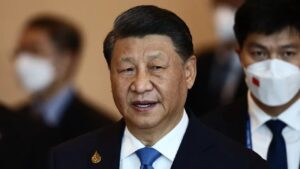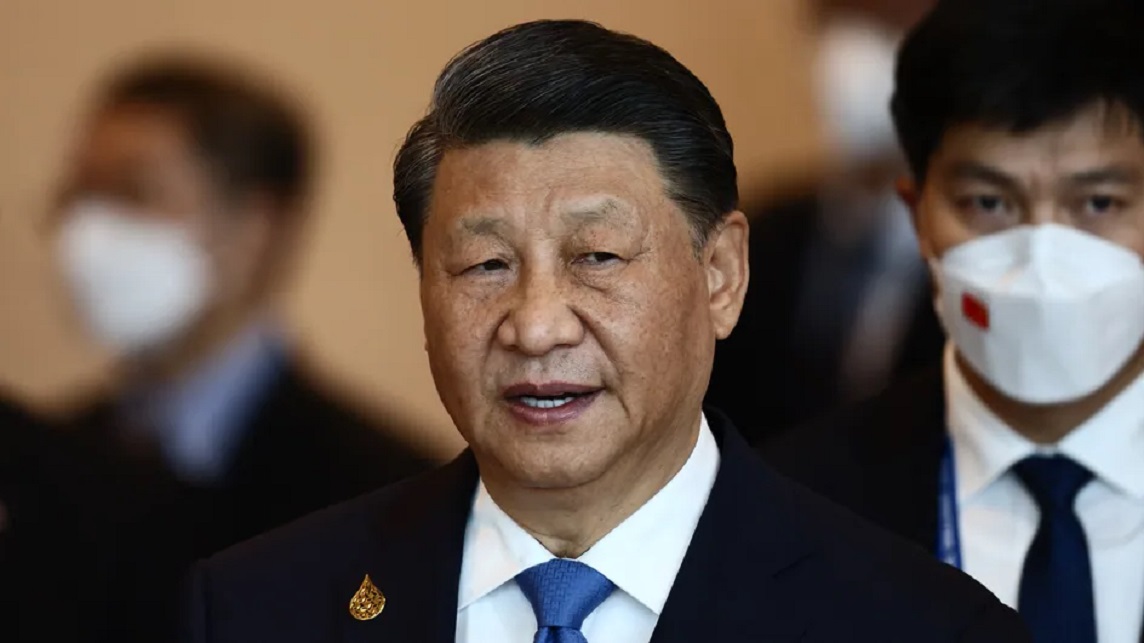The sudden abandonment of the “zero Covid” policy by the Chinese government in December has frightened the country’s citizens, as infections soar and health services are overstretched. What to rock the communist power? Not so sure.
 Chinese President Xi Jinping on November 19, 2022 in Bangkok (Thailand), during an Asia-Pacific Economic Cooperation (APEC) summit. (AFP)
Chinese President Xi Jinping on November 19, 2022 in Bangkok (Thailand), during an Asia-Pacific Economic Cooperation (APEC) summit. (AFP)
From almighty president to weakened leader. Chinese President Xi Jinping, in office since 2020, seemed at the height of his power last October, after being re-elected with great fanfare as head of the Communist Party. A step that ensures him to be re-elected president in March 2023 for a third term, solidifying his hold on the regime. But the protests linked to his “zero Covid” policy and the chaos created by the total reversal of health policy have been there. The explosion of contaminations since the beginning of December – 13 million according to the government, a figure largely underestimated according to the UN * – could weaken the power in place.
Let’s rewind. At the start of 2020, criticized for having poorly communicated and managed the appearance of Covid-19 in Wuhan, China wishes to appear as a model in terms of managing the pandemic. Very quickly, it defined its doctrine, characterized by the triptych “test, trace, isolate”. Thanks to targeted confinements, massive screening campaigns and an impressive deployment of resources, the country has succeeded in considerably reducing contamination and the number of deaths linked to Covid-19.
Power does not hide its feeling of superiority, while Europe and the United States chain the waves of contamination. “When we look at the situation at the start of 2021, China is still more or less a winner in the fight against the pandemic with a very low number of deaths”, relates Jean-Louis Rocca, professor at Sciences Po and specialist in China. . After the mess at the start of the pandemic, “the ‘zero Covid’ policy made it possible to prove to the world that China had managed things better than other countries”, but also “to show the Chinese that the government was capable of protect”, sums up the researcher.
A refusal to abandon “zero Covid”
The situation is changing during the year 2021. Western countries are gradually abandoning confinements, as they vaccinate their populations. China clings to its “zero Covid” policy. Beijing does not move either when, at the beginning of 2022, countries like Taiwan, Australia or South Korea, which had adopted a similar strategy, decide to open up to the rest of the world. “From that moment on, the government becomes complacent and frees itself from reality,” said Steve Tsang, director of the China Institute at the School of Oriental and African Studies in London.
The choice of the Chinese authorities is partly explained by the relative failure of its vaccination campaign. Beijing notably refuses to use foreign vaccines when Chinese vaccines are less effective, according to a study published by The Lancet* last April. Vaccination of seniors is also struggling. By November 2022, only 68.2% of over-60s had received three doses of the vaccine, reports Reuters*. The result is a risk of congestion of the hospital system, already saturated, in the event of a wave of contamination.
Result: the confinements of large cities follow one another in 2022, at the cost of an often dysfunctional organization. “China is very strong in emergency situations, explains Jean-Louis Rocca. But the problem is that the ‘zero covid’ policy was managed over the long term by local authorities, who had no not always the skills and who sometimes did not make the right choices.” The anti-Covid policy has “derailed the economy”, explains the HuffPost, with slow growth and more and more people unemployed. A problem for Xi Jinping, who has made good economic results one of the arguments for his hold on power.
A contested policy in the streets
The three years of repeated confinements end up annoying some of the Chinese. At the end of November, a little over a month after the triumphant re-election of Xi Jinping as head of the Communist Party, demonstrations broke out in several major Chinese cities, including Shanghai and Beijing. These gatherings worry the power. “We cannot say that they are without precedent, since strikes for specific demands are common in China”, specifies Jean-Louis Rocca. But “this is the first time since 1999 that the demonstrators are asking the government to resign, and that the demands relate to the overall policy of the authorities”, adds Steve Tsang.
Under pressure from the streets, the Chinese government ended up taking, on December 7, a decision considered impossible a few weeks earlier: the almost total abandonment of the “zero Covid” policy. “A reversal like that is unheard of,” explains Stéphanie Balme, professor, research director at the Science Po International Research Center and China specialist. “This shows the great nervousness of the authorities. The reality was denied for a very long time by the power, but it caught up with them and the dikes were blown up.”
The consequences of the abandonment of mandatory tests and isolations are not long in coming. Hospitals and crematoriums quickly find themselves overwhelmed by the scale of the infections and the medicines run out. Little vaccinated, the Chinese population has not developed immunity to the virus. The authorities even find themselves unable to estimate the real extent of the wave of contamination, the National Health Commission having stopped communicating on the subject. According to an estimate by the specialized company Airfinity* dated January 13, the number of daily infections would be 3.7 million. A dizzying number.
A questioning of the social contract
The situation worries Chinese citizens, especially since their leaders deny the problems. “It’s simple, they hadn’t planned anything when they had three years to do it,” asserts Steve Tsang. “This situation has a strong impact on the relationship of trust of civil society with regard to power, judge Stéphanie Balme. Many people say to themselves that the last three years have been useless. Others are frightened because the government told them for three years that the Covid was extremely dangerous.” In one decision, it is the social contract between the Communist Party and the population that is called into question: “The Chinese accept that the party governs in exchange for protection and prosperity, and there, that is no longer the case” , summarizes Jean-Louis Rocca.
The crisis may well “weaken” Xi Jinping’s hold on his party, as estimated by The Guardian *. Aware of the problem, the president reacted by adorning his New Year’s address on December 31 with an unusually conciliatory tone. Xi Jinping thus judged that “the prevention of the epidemic was entering a new wave”, urging the Chinese “to work harder, because persistence and unity result in victory”, reports Euronews *. “His speech tried to project China into the future, reaffirming that the party remains the supreme authority which is able to ensure the happiness of the country, analyzes Stéphanie Balme. He launched fewer attacks against the West and got down to saying that you have to respect the different opinions of the Chinese people.”
Communist power in danger?
Is this nervousness of power enough to call into question the reappointment of Xi Jinping at the head of the country, scheduled for March? “The Covid has certainly damaged his reputation, but he remains in control of the party and the army, that is not enough to call him into question completely”, slice Steve Tsang. An opinion that Jean-Louis Rocca does not share.
“For me, Xi Jinping is above all the symbol of the unity of the party, if this crisis weakens the state apparatus too much, no one will hesitate to blow it up. We must rather ask ourselves the question of the link between the ‘State and Population.’
It’s hard to know what’s going on at the Central Committee of the Communist Party, a small group of people at the top of power, as the mysteries of government are so inaccessible. To try to understand the extent of the impact of this crisis on the Communist Party, “we will have to keep an eye on the Chinese New Year celebrations on January 22, as well as the meeting of the two popular assemblies scheduled for February and the choice of the next Prime Minister”, suggests Stephanie Balme.
The contestation of the authorities by the population will depend on the sequence of events… and the number of deaths. “If there are 1.7 million deaths by April, as Airfinity predicts, then that could have an impact on the Communist Party,” thinks Jean-Louis Brocca. “Be careful, the Covid alone will not bring down the government”, retorts Steve Tsang. “We are still talking about a party which caused 40 million deaths at the end of the 1950s with the great famine caused by its economic policy and which remained in power.”
The Covid is not the only subject that occupies the minds of the Chinese anyway, but “one element among others”, according to Jean-Louis Brocca: “Things are played out on the question of employment, prosperity and reproduction of the middle class.” If the economy does not recover, the Chinese could lose the belief that their government is doing better than the others. And that “could have totally unpredictable consequences”, believes Stephanie Balme.

